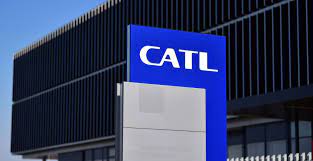
CATL, China's battery giant, is working on new battery materials that can improve energy density by 10 per cent to 20 per cent over iron phosphate batteries, according to the company's chairman, as the battery giant scrambles to maintain its lead amid competition.
Zeng Yuqun stated at the World New Energy Vehicle Congress in Beijing on Saturday that the new material technology known as M3P can enable an electric vehicle to run 700 km (430 miles) per charge when combined with CATL's next generation of battery pack technology.
He also stated that the new materials will be less expensive than nickel and cobalt-based batteries.
Zeng, on the other hand, did not specify which metals will be used in M3P batteries or when mass production might begin.
CATL, whose clients include Tesla, Volkswagen, BMW, and Ford, is the world's largest battery manufacturer, accounting for more than a third of global EV battery sales.
It intends to extend its lead over competitors such as LG Energy Solution and BYD by accelerating global expansion and innovation in new battery technologies.
According to Wan Gang, Vice Chairman of China's national policy advisory body, the global market for EV batteries is expected to reach $250 billion by 2030, with demand surpassing 3.5 terrawatt hours. CATL also announced on Saturday that it will supply Qilin batteries with its latest battery pack technology to power Geely Automobile Holdings' Zeekr cars, which are set to hit the market in early 2019.
CALT introduced the Qilin battery in June, claiming a 13% higher energy density compared to the same size pack of Tesla's 4680 cylindrical battery cells— 46 millimetres in diameter and 80 millimetres in length, while using the same materials.
(Source:www.carandbike.com)
Zeng Yuqun stated at the World New Energy Vehicle Congress in Beijing on Saturday that the new material technology known as M3P can enable an electric vehicle to run 700 km (430 miles) per charge when combined with CATL's next generation of battery pack technology.
He also stated that the new materials will be less expensive than nickel and cobalt-based batteries.
Zeng, on the other hand, did not specify which metals will be used in M3P batteries or when mass production might begin.
CATL, whose clients include Tesla, Volkswagen, BMW, and Ford, is the world's largest battery manufacturer, accounting for more than a third of global EV battery sales.
It intends to extend its lead over competitors such as LG Energy Solution and BYD by accelerating global expansion and innovation in new battery technologies.
According to Wan Gang, Vice Chairman of China's national policy advisory body, the global market for EV batteries is expected to reach $250 billion by 2030, with demand surpassing 3.5 terrawatt hours. CATL also announced on Saturday that it will supply Qilin batteries with its latest battery pack technology to power Geely Automobile Holdings' Zeekr cars, which are set to hit the market in early 2019.
CALT introduced the Qilin battery in June, claiming a 13% higher energy density compared to the same size pack of Tesla's 4680 cylindrical battery cells— 46 millimetres in diameter and 80 millimetres in length, while using the same materials.
(Source:www.carandbike.com)














